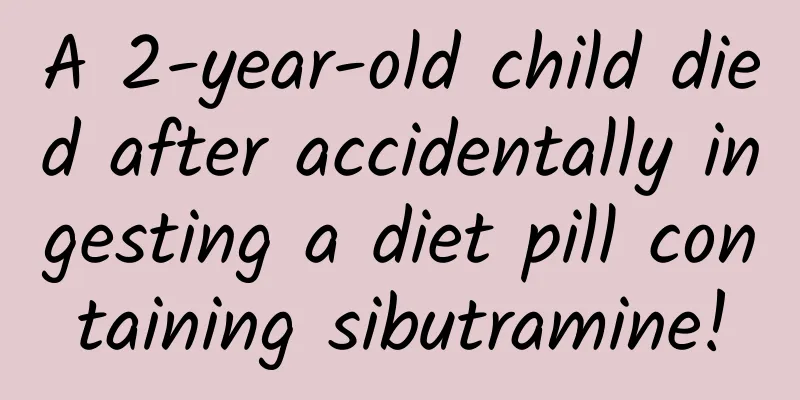A 2-year-old child died after accidentally ingesting a diet pill containing sibutramine!

|
Recently, the news that a 2-year-old child died after accidentally taking a diet pill containing sibutramine has sparked heated discussions. What exactly is "sibutramine"? What other tricks are there in diet products? Interview experts: Liu Zhimin (Member of the United Nations Office on Drugs and Crime (UN0DC) Network Scientist, Researcher at the Chinese Institute of Drug Dependence, Peking University) Wei Wei (Professor of Pharmacology, Anhui Medical University) Recently, a hot Weibo post about a 2-year-old girl who accidentally ate a diet pill containing sibutramine and died has sparked heated discussions. This is because sibutramine, a prescription drug that is expressly prohibited from being added to food, was detected in the girl's blood and gastric juice. Whenever tragedies like this occur, people can't help but wonder - what are the drugs that are banned from being added to food? And how do these drugs work? What exactly was the sibutramine that the girl accidentally ingested? Sibutramine, also known as sibutramine hydrochloride, is an appetite suppressant used to treat obesity (it works by affecting the release and reuptake of neurotransmitters in the hypothalamus, stimulating the hypothalamic satiety center, and producing a sense of fullness). It was originally used as a drug to treat depression. However, in clinical applications, it was found that its weight loss effect was significantly better than its antidepressant effect, so it was used in the development of weight loss drugs to treat pathological obesity. The drug was approved for marketing in the United States in 1997 and in my country in 2000. However, with the widespread use of sibutramine, a long-term clinical trial showed that long-term use of sibutramine can cause many adverse reactions. Zhang Yue, chief nutritionist of the Nutrition Department of Nanjing Maternal and Child Health Hospital, once pointed out in an interview with the media that sibutramine mainly achieves weight loss effects by suppressing appetite and enhancing metabolism, but it can cause many problems such as increased heart rate and blood pressure, and in severe cases can cause stroke in the user. And because sibutramine works through neurotransmitters, and neurotransmitter receptors are widely distributed in the body, sibutramine also acts on the pulmonary blood vessels in the body. In 1998, the World Health Organization listed this type of appetite suppressant as an important risk factor for pulmonary hypertension. In addition, in addition to causing pulmonary hypertension, appetite suppressant-type weight loss drugs are also prone to addiction and dependence. (Image source: Screenshot from the official website of the State Drug Administration) Therefore, it is not difficult to understand why in 2010, my country's State Food and Drug Administration announced the cessation of domestic production, sales and use of sibutramine preparations and raw materials. However, this banned ingredient in weight-loss drugs, which has long been banned from production, sale and use, has continued to stir up trouble in recent years. In May 2020, the Public Security Bureau of Liaoyuan City, Jilin Province, discovered that a store in a shopping mall in Liaoyuan City was selling foods such as "Slimming Magica" and "Slimming S Enzyme". Further investigation revealed that the products contained sibutramine. In June 2020, the State Administration for Market Regulation reported that on May 16, the Hedong police in Linyi, Shandong destroyed a criminal chain that produced and sold toxic and harmful weight-loss products. The amount involved was as high as more than 5 million yuan, and 5 kilograms of sibutramine were seized. It is worth noting that sibutramine has also been found in dried fruits, candied fruits, slimming coffee, enzymes and other foods that are commonly claimed to have weight loss effects on the market. In addition, in recent years, there are also some weight loss products that add other banned drugs. What other “tricks” are there in Internet celebrity weight loss products? Regarding the mechanism of action of weight loss drugs, Wei Wei, professor of pharmacology at Anhui Medical University, said in an interview with our reporter: The mechanism of action of weight loss drugs involves many aspects, mainly achieving the effect of weight loss by affecting the central nervous system and fat metabolism. Moreover, the working principles of weight loss products currently available at home and abroad are generally divided into the following categories: Hormone weight loss drugs promote the decomposition and metabolism of proteins and fats in the body through the intake of hormones to achieve the purpose of weight loss; Appetite suppressants act directly on the central nervous system to reduce appetite and lose weight; Slimming teas act on the gastrointestinal tract, promote gastrointestinal motility, and accelerate the metabolism of body fat and calories. However, there are also some weight loss products that illegally add laxative or diuretic ingredients, which allow people to reduce the water content in the body in a short period of time, creating the illusion of weight loss. In addition, there have been some illegal products that took risks by adding banned drugs. For example, last year, the Internet celebrity DC weight loss pills became popular for a while, but they quickly "turned over" because they contained psychotropic ingredients such as amphetamine, phentermine, and diazepam. Because amphetamine and phentermine both have central excitation and appetite suppression effects. Moreover, in the United States, these two drugs are legal drugs for specific groups of people used for short-term obesity control (for example, BMI ≥ 30), but they have not been approved for marketing in China. (Photo source: Screenshot from Youth Daily Weibo) Liu Zhimin, a member of the United Nations Office on Drugs and Crime (UNODC) network scientist and a researcher at the Institute of Drug Dependence of Peking University, said in an interview with our reporter: Psychotropic drugs cannot be used in diet pills. This is because psychotropic drugs are drugs (or substances) that are regulated by the state and have varying degrees of drug dependence or addiction. Long-term use will lead to addiction. Moreover, psychotropic drugs do not have the indication of "weight loss". Therefore, from a medical and legal perspective, adding psychotropic drugs to diet pills not only harms the physical and mental health of individuals, but is also illegal. In addition, Wei Wei added: Psychotropic drugs mainly affect the central nervous system and can cause dependence (including physical dependence and mental dependence). They are divided into Class I and Class II according to the degree and severity of the dependence, and are used clinically to treat special diseases. Let's talk about the diuretics and laxatives that were added in violation of regulations. Diuretics (such as hydrochlorothiazide and hydrochlorothiazide) mainly use "dehydration" to temporarily reduce weight, and laxatives (such as sacodyl and phenolphthalein tablets commonly used to treat stubborn constipation) reduce weight through diarrhea. These two ingredients can reduce the water content in the body in a short period of time, creating the illusion of weight loss. This kind of "weight loss" has nothing to do with reducing fat. If taken frequently, it may also cause dizziness, vomiting, dehydration, electrolyte imbalance, intestinal damage, anemia and other problems. Drug abuse is harmful, correct weight loss is the key At present, there are not many drugs that have been approved for formal circulation in the market. In my country, the only chemical weight loss drug that has been approved for marketing is orlistat, which was launched in my country in 2000 and converted to an over-the-counter drug at the end of 2005. But not everyone needs to take weight loss drugs. At present, the over-the-counter indications of orlistat are: for the treatment of obese or overweight patients (BMI ≥ 24). ▲Orlistat capsules (picture from the Internet) In addition, in the pursuit of weight loss, many people have reported that there are too many pitfalls when losing weight through drugs and other means. Because some illegally circulated drugs often lack corresponding label and instruction information. Sometimes patients cannot even understand the drug ingredients and content. Therefore, during use, patients also lack the evaluation and monitoring of doctors, which makes them helpless in the process of taking drugs and facing many unknown risks. Moreover, whether you lose weight through drugs or dieting, it may cause a series of adverse effects on the body, such as memory loss, fatigue, loose skin, anemia, irregular menstruation, and thyroid dysfunction. Among them, last year, many Japanese purchasing agents strongly recommended a "net celebrity diet pill" that claimed to lose 7 to 15 pounds per month. According to reports, although you may lose weight after taking it, it may also cause hyperthyroidism and affect your health. (Photo source: Screenshot from People's Daily Weibo) As for the use of weight-loss drugs, Wei Wei suggested that the abuse of drugs that affect the central nervous system can lead to adverse reactions in multiple systems such as the nervous system, cardiovascular system, respiratory system, digestive system, etc., and the efficacy of weight-loss drugs used abroad is not certain, and there have been reports of many serious adverse reactions, and the safety issues are worrying. Therefore, when faced with a dazzling array of weight loss products that may bring many unknown risks, losing weight scientifically and rationally becomes extremely important. So, what is the scientific and reasonable way to lose weight? Wei Wei suggested that according to your own protein, sugar, fat and other test indicators, accurately and reasonably arranging diet and physical exercise is the healthier choice among many weight loss methods. And you should also adjust your weight loss measures in time with changes in your physical condition. In general, losing weight for health purposes is understandable. But if you blindly lose weight for the purpose of slimming down and endanger your health, is it still worth it? Written by reporter Song Meng New Media Editor/David Duan (Intern) Produced by: Science Central Kitchen Produced by: Beijing Science and Technology News | Science Plus Client Welcome to share to your circle of friends Reprinted by public accounts, newspapers, etc. Please send an email to [email protected] Reproduction without authorization is prohibited, and offenders will be prosecuted |
<<: How does self-heating underwear generate heat out of thin air?
Recommend
Mid-year shopping festival 618, let's take a look at the routines of online activities
Now, as long as you open the various shopping app...
Harvard has tracked the lives of 724 people for nearly 80 years: What kind of people are most likely to be happy? The answer subverts cognition!
If you could invest in your future or your childr...
Is the promotion cost too high? You need to build a self-growth operating system
Recently, I have received a lot of inquiries abou...
Google is killing off micro SD cards
Like it or not, micro SD cards and Android devices...
Community operation: How to build a high-quality and active community?
Communities have become a standard feature of Int...
How to effectively improve product conversion rate?
In the use process of different products, users&#...
Douyin short video APP competitive product analysis report!
background: As a new product manager of Tencent&#...
How much does it cost for a mini program development company to develop a mini program?
As people’s understanding of mini programs deepen...
When you go on a long trip, remember to turn off the gas!
□ Popular Science Times reporter Zhang Yingxian R...
Android users contribute 20% of iPhone sales every quarter due to phone switching
According to a research report from a leading com...
I want to set up IP exclusion in Baidu bidding. Where can I find the IP to be excluded?
I want to set up IP exclusion in Baidu bidding. T...
QQ Members’ 20th Anniversary New Feature “Energy Value” Launched: See How Much Your QQ Is Worth
QQ Member was born in 2000. On its 20th anniversa...
What will be the hottest thing in 2016?
[[161131]] 2016 has arrived. I wonder if you have...
Is Papi Jiang really hard to replicate?
The short video industry started to boom in 2016....
China’s first batch of six drug-sniffing squirrels have been deployed. Can they take on this important task?
We know that there are drug detection dogs, but h...









